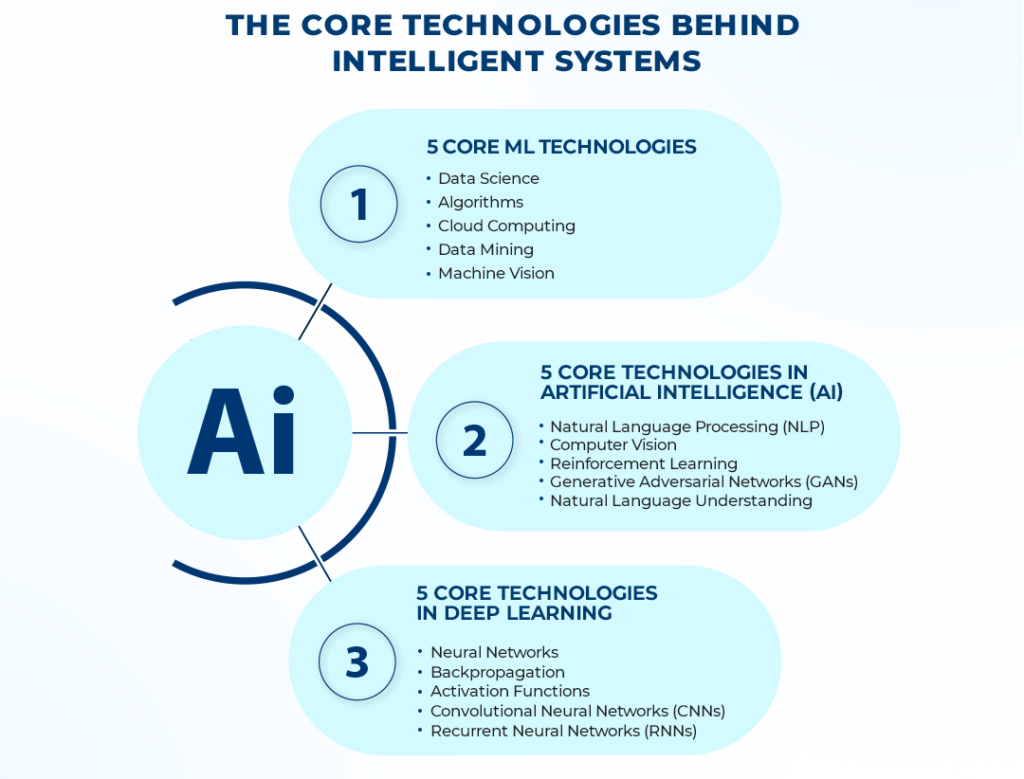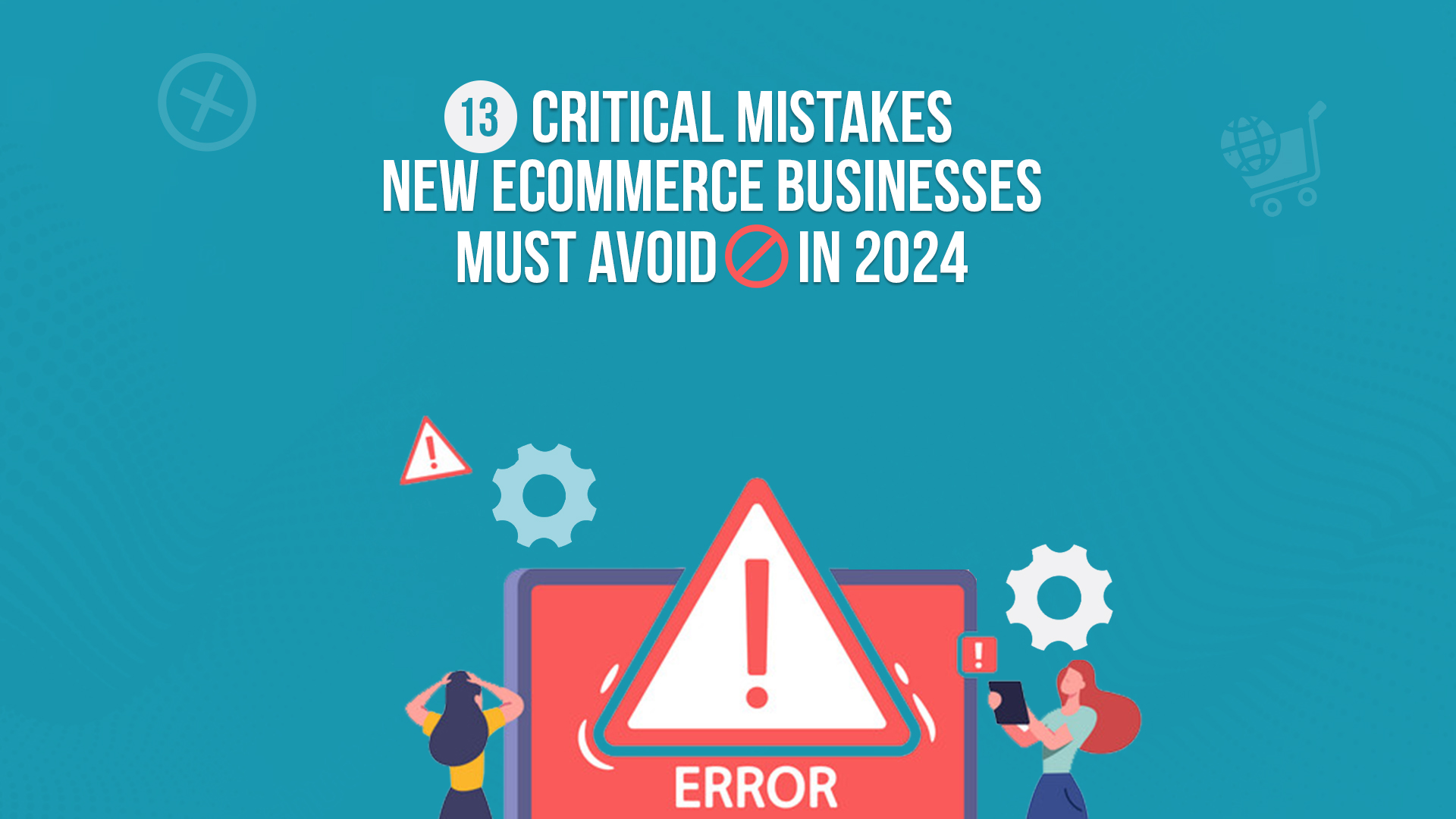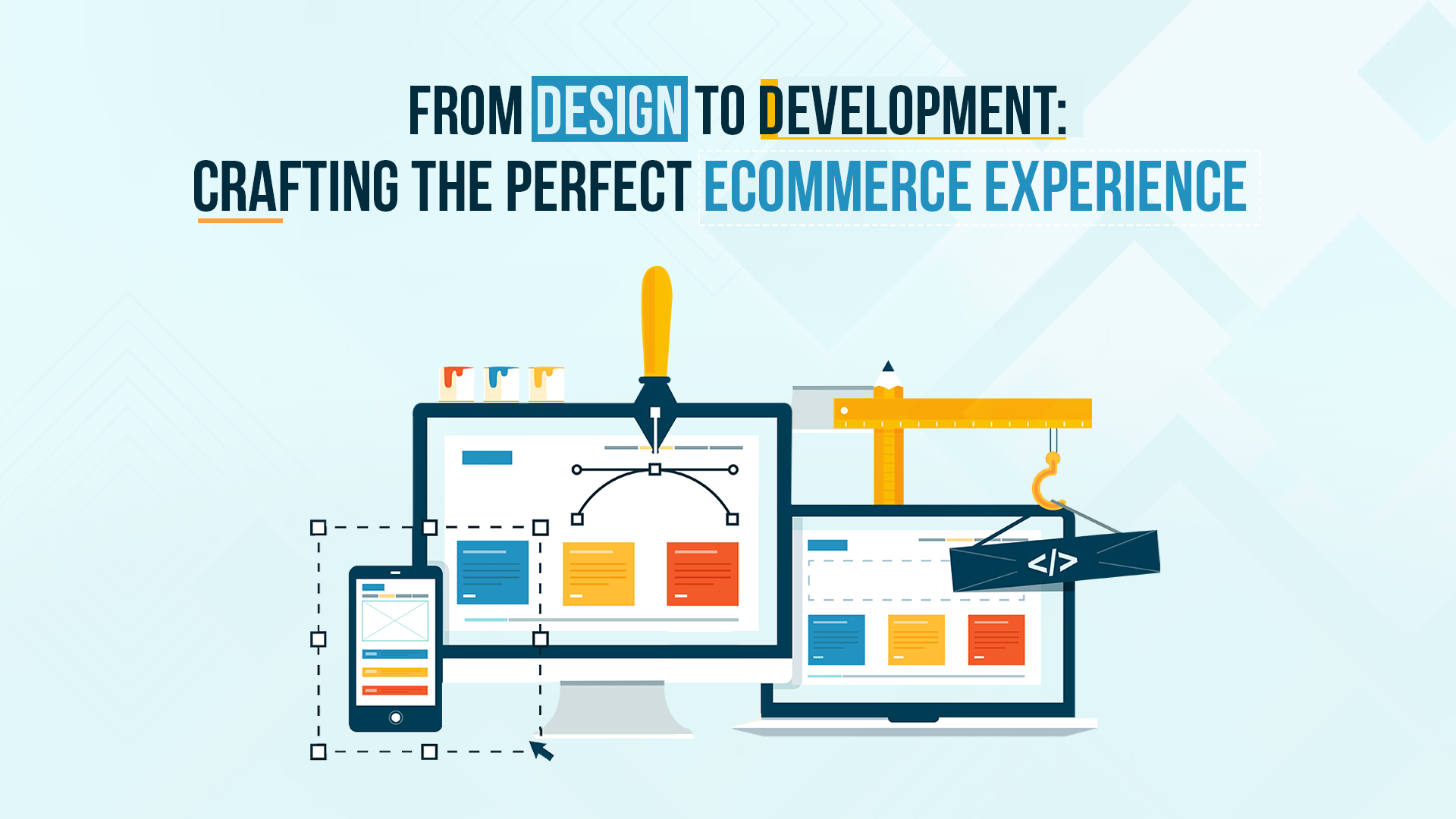In the ever-changing world of software, Artificial Intelligence (AI) and Machine Learning (ML) have become incredibly important. They’re like smart helpers for computers, teaching them to think and learn, making difficult tasks easier, and greatly improving how things work. These technologies have changed many industries and are driving the digital transformation of our time. In this blog, we’ll explore how AI and ML are making a big difference in software, changing the way we do things, and shaping our future.
Understanding AI and ML
AI, which stands for Artificial Intelligence, is a branch of computer science that enables machines to imitate human intelligence and perform tasks that usually require human cognition, such as decision-making and problem-solving.
ML, which is the subset of AI, is focused on developing algorithms that can learn and improve from data without being explicitly programmed. It functions like a digital brain that evolves as it processes information.
These interrelated technologies are the driving force behind the transformative impact of AI and ML on software solutions. They enable machines to learn and think, transforming various industries and shaping our digital future.
The Integration of AI and ML in Software Solutions
Simplified AI and ML Automation
Artificial Intelligence (AI) and Machine Learning (ML) are revolutionizing software by automating repetitive tasks. Businesses use historical data and ML algorithms to simplify operations, reduce errors, and optimize efficiency. This increased automation saves time and allows employees to focus on more strategic and creative endeavors, ultimately boosting productivity and innovation.
Personalized User Experiences through AI-driven Software
AI-powered software can create personalized user experiences. It studies how users behave and interact with the software and then offers them custom product suggestions, content, and services. This personalized approach makes customers more loyal and engaged, giving businesses a competitive advantage and making users happier with the service.
Informed Decision Making with Predictive Analytics
AI and ML algorithms enable predictive analytics, a powerful tool for data-driven decision-making. Businesses can analyze historical data and identify patterns to predict outcomes, assess risks, and forecast demand. Predictive analytics empowers organizations to make informed decisions, allocate resources effectively, and stay ahead in dynamic markets, resulting in better business outcomes and increased success.
Enhancing Communication with Natural Language Processing (NLP)
NLP is changing the way humans and machines communicate. AI-powered virtual assistants, chatbots, and sentiment analysis tools can understand and interpret human language, making interactions with software solutions more natural and efficient. This advancement in NLP facilitates seamless communication between machines and humans, leading to improved customer support, enhanced user experiences, and more effective analysis of textual data.
Transforming Industries through Image and Speech Recognition
AI and ML have brought transformative applications in various industries through advanced image and speech recognition capabilities. These technologies enable facial recognition for enhanced security, assist in medical imaging diagnosis for more accurate healthcare assessments, and power various other use cases across sectors. By leveraging AI-driven image and speech recognition, industries can achieve improved efficiency, increased safety, and enhanced overall performance.
Safeguarding Businesses with Intelligent Fraud Detection and Cybersecurity
AI-driven fraud detection and cybersecurity solutions are essential for protecting businesses from potential threats. ML algorithms can analyze patterns and anomalies, enabling intelligent systems to detect fraudulent activities and safeguard sensitive data. This proactive approach to cybersecurity helps businesses prevent financial losses and maintain the trust of their customers and stakeholders, ensuring a secure and reliable digital environment.
Gaining Insights with Sentiment Analysis and Market Research
AI-based sentiment analysis is a tool for businesses to understand public opinion and customer feedback. By analyzing sentiments expressed in online reviews, social media posts, and other sources, companies can gain insights into customer preferences and identify areas for improvement. This market research driven by AI empowers businesses to make data-backed decisions, refine their products and services, and tailor their marketing strategies to meet the ever-evolving demands of consumers.
Best Practices for Implementing AI and ML in Software Projects

The integration of Artificial Intelligence (AI) and Machine Learning (ML) into software projects offers immense potential for innovation and efficiency. However, to reap the full benefits and avoid common pitfalls, organizations and developers should adhere to a set of best practices:
- High-Quality Data: The foundation of successful AI and ML projects is high-quality data. Ensure that your datasets are diverse, well-structured, and representative of the problem you’re trying to solve. Poor data quality can lead to inaccurate models and biased results.
- Data Privacy and Ethics: Respect data privacy regulations and ethical considerations. Establish clear guidelines for handling sensitive data and ensure that your AI models do not perpetuate biases or discriminate against specific groups.
- Model Interpretability: Prioritize using explainable AI algorithms, especially in critical applications like healthcare and finance. Model interpretability ensures that the decision-making process of AI is transparent and accountable.
- Continuous Learning: Machine learning models should not be static. Regularly update your AI models to keep them relevant and accurate. Changing data patterns and user behaviors necessitate ongoing model improvements.
- Collaboration: Encourage collaboration between technical and non-technical teams within your organization. Bridge the gap between data scientists, engineers, and domain experts to leverage AI effectively across the entire project lifecycle.
- Start Small: Begin with smaller, manageable AI and ML projects to build expertise and gain confidence. As your team becomes more proficient, you can tackle more complex challenges.
- Experimentation: Embrace a culture of experimentation. Test different algorithms, approaches, and data sources to discover what works best for your specific problem. Failures are valuable learning experiences.
- Clear Objectives: Define clear objectives and key performance indicators (KPIs) before starting an AI or ML project. Understand what success looks like and how it will impact your organization.
- Scalability: Plan for scalability from the outset. Ensure that your AI and ML infrastructure can handle increased data loads and growing user demands as your software project evolves.
- User-Centric Design: Keep the end user in mind throughout the development process. AI should enhance the user experience, not complicate it. Aim to deliver solutions that are intuitive and user-friendly.
- Security: Implement robust security measures to protect your AI models and data. Regularly audit your system for vulnerabilities and apply security patches promptly.
- Documentation: Thoroughly document your AI and ML models, data preprocessing steps, and model training processes. This documentation will be invaluable for troubleshooting and knowledge sharing.
- Compliance: Stay informed about relevant industry regulations and standards, especially if your software project deals with sensitive data or critical applications.
- Feedback Loop: Establish a feedback loop with users to continuously improve your AI solutions. User feedback can reveal areas for refinement and enhancement.
- Monitoring and Maintenance: Implement comprehensive monitoring to track the performance of your AI models in real-time. Set up alerts for anomalies and performance degradation. Regular maintenance ensures that your models stay effective.
By following these best practices, organizations can navigate the challenges and complexities of integrating AI and ML into software projects while maximizing the benefits of these transformative technologies. Ultimately, a well-executed AI and ML strategy can drive innovation, efficiency, and competitiveness in the rapidly evolving software landscape.
Challenges and Limitations
The integration of Artificial Intelligence (AI) and Machine Learning (ML) into software solutions brings about remarkable opportunities but also presents several significant challenges and limitations that need to be acknowledged and addressed.
Data Quality and Bias: Poor data quality can lead to inaccurate results, while biased data can perpetuate discrimination and unfair outcomes. Rigorous data curation and ongoing monitoring are essential to mitigate these issues.
Explainability and Interpretability: Many AI models, especially deep learning ones, operate as “black boxes,” making it difficult to understand how they arrive at specific decisions. This lack of transparency raises ethical concerns, particularly in critical applications like healthcare and finance.
Skillset Gap: Developing effective AI solutions demands expertise in data science, statistics, and machine learning, which can be scarce and challenging to acquire.
Integration Complexity: Retrofitting AI capabilities into existing software systems often necessitates significant modifications, making it a daunting task for many organizations.
Data Privacy and Security: AI systems require access to extensive datasets, leading to concerns about data privacy and security. Ensuring robust measures to safeguard sensitive data and comply with data protection regulations is paramount.
Ethical Considerations: AI-driven decisions can have profound ethical implications, particularly in areas like autonomous vehicles, criminal justice, and healthcare. Ensuring fairness, transparency, and accountability is paramount.
Resource Intensity: Training advanced AI models demands substantial computational resources, which can be expensive and energy-intensive, potentially limiting accessibility for smaller organizations.
Human-AI Collaboration: Achieving harmonious collaboration between humans and AI systems, particularly in job automation scenarios, is a complex challenge. Balancing the benefits of automation with job preservation and retraining is a societal concern.
Regulatory Compliance: Staying compliant with evolving AI regulations and standards is a significant challenge for businesses, with non-compliance carrying legal and reputational risks.
Bias and Fairness: AI models may inherit biases from training data, leading to unfair outcomes. Addressing bias and ensuring fairness require vigilant monitoring and mitigation efforts.
Interoperability: AI and ML models may not seamlessly integrate with existing software and hardware infrastructure, posing interoperability challenges.
Sustainability: There is growing concern about the environmental impact of AI, particularly in terms of energy consumption for training large models. Efforts are underway to develop more energy-efficient algorithms and hardware.
Acknowledging these challenges and limitations is crucial to responsible AI and ML development. Addressing them proactively is essential to unlock the full potential of these technologies while ensuring ethical, transparent, and sustainable progress.
The Future of AI and ML in Software Solutions

The journey of Artificial Intelligence (AI) and Machine Learning (ML) in software development has just begun. The future holds immense potential for even greater advancements in this field. One exciting prospect is autonomous software development, where AI-driven systems may become capable of developing software autonomously, with minimal human intervention. This shift could revolutionize the software development process, making it faster and more efficient.
In addition, AI-assisted collaboration is set to become a norm. Developers will increasingly collaborate with AI systems to boost productivity and creativity, with AI aiding in code generation, debugging, and optimization. This synergy between humans and machines promises to accelerate innovation in software development.
The growth of Explainable AI (XAI) is also on the horizon. Increasingly, AI solutions will prioritize transparency and interpretability, ensuring that the decision-making process of AI-powered applications can be understood and trusted. This will be especially crucial in critical sectors like healthcare, where AI’s decisions impact patient outcomes.
Furthermore, ethical AI will become a focal point in software development. AI solutions must adhere to ethical considerations and guidelines to mitigate potential biases and promote fairness. This shift towards ethical AI will not only ensure fair outcomes but also safeguard against potential controversies.
Hyper-personalization is another trend set to gain momentum. AI will continue to drive hyper-personalization, creating software experiences that are tailored to individual users’ preferences and needs. This personalization will enhance user satisfaction and engagement.
Finally, AI-driven continuous delivery pipelines will become more prevalent. With automated testing, deployment, and monitoring, AI will enable software development teams to achieve continuous delivery with greater efficiency and reliability.
Conclusion:
In conclusion, the future of AI and ML in software development is bright and promising. These technologies will empower businesses and developers to create innovative, efficient, and ethical software solutions that shape industries and drive success in the digital age. Embracing AI and ML today will undoubtedly pave the way for a transformative and exciting future in software development.
So, what are you waiting for?
Schedule your appointment now and talk to us about owning a software application using AI-based deployment.










